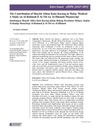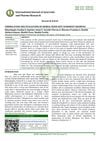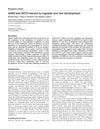 1 citations,
July 2017 in “Journal of Pharmacognosy and Phytochemistry”
1 citations,
July 2017 in “Journal of Pharmacognosy and Phytochemistry” The study concluded that standardizing Thuja orientalis bark helps in its identification and quality control.
 1 citations,
February 1977 in “Archives of Dermatology”
1 citations,
February 1977 in “Archives of Dermatology” Fresh plasma transfusions did not help treat Leiner disease in an infant.
 January 2024 in “Journal of Natural Remedies”
January 2024 in “Journal of Natural Remedies” Solanum nigrum extract may help regrow hair.
 May 2023 in “Jurnal Sains Insani”
May 2023 in “Jurnal Sains Insani” Shaykh Abbas Kuta Karang significantly advanced Malay medical knowledge with his detailed manuscript.
 February 2023 in “European journal of geriatrics and gerontology”
February 2023 in “European journal of geriatrics and gerontology” Selenium helps prevent thyroid issues and cognitive decline in the elderly, but balance is key.
 January 2023 in “International journal of Ayurveda and pharma research”
January 2023 in “International journal of Ayurveda and pharma research” The herbal shampoo is effective and safe for use.
 January 2022 in “Acta botanica Caucasica”
January 2022 in “Acta botanica Caucasica” Turkish herbal cosmetics use various plants for hair care, skincare, and other personal hygiene purposes.
 March 2021 in “Research Square (Research Square)”
March 2021 in “Research Square (Research Square)” The SbbHLH85 protein helps sweet sorghum grow more root hairs but makes the plant more sensitive to salt.
 September 2020 in “Nature, Environment and Pollution Technology/Nature, environment and pollution technology”
September 2020 in “Nature, Environment and Pollution Technology/Nature, environment and pollution technology” Eating plants from polluted areas can cause liver and kidney damage in rats due to toxic metals.
 April 2019 in “Dermatology reports”
April 2019 in “Dermatology reports” A 12-year-old boy's hair fully regrew after 8 weeks of treatment for tinea capitis, and dermoscopy was useful for diagnosis and monitoring.
 April 2017 in “International journal of research in Ayurveda and pharmacy”
April 2017 in “International journal of research in Ayurveda and pharmacy” Ayurvedic methods can help reduce the harmful effects of chemicals in cosmetics.
 October 2012 in “Humana Press eBooks”
October 2012 in “Humana Press eBooks” Grape seed extract is good for skin care, with antioxidant, anti-inflammatory, and anti-cancer effects.
 480 citations,
August 2014 in “Nature Biotechnology”
480 citations,
August 2014 in “Nature Biotechnology” Changing the environment around stem cells could help tissue repair, but it's hard to be precise and avoid side effects.
 418 citations,
June 2003 in “Endocrine Reviews”
418 citations,
June 2003 in “Endocrine Reviews” While PCOS might increase the risk of heart disease, there's not strong evidence to prove it causes earlier heart problems.
 356 citations,
March 2012 in “Trends in Plant Science”
356 citations,
March 2012 in “Trends in Plant Science” Auxin and ethylene hormones both work together and against each other to control plant growth.
 287 citations,
January 2013 in “Journal of Ginseng Research”
287 citations,
January 2013 in “Journal of Ginseng Research” The ginseng market has potential for growth and needs new products and better marketing.
 205 citations,
August 2007 in “Experimental Cell Research”
205 citations,
August 2007 in “Experimental Cell Research” Stem cell niches are crucial for regulating stem cell renewal and differentiation, and understanding them can help in developing regenerative therapies.
 188 citations,
May 2009 in “Plant physiology”
188 citations,
May 2009 in “Plant physiology” Researchers found 19 genes important for root hair growth in a plant called Arabidopsis.
 169 citations,
September 2010 in “Molecular & cellular proteomics”
169 citations,
September 2010 in “Molecular & cellular proteomics” Pectin biosynthesis is essential for the growth of cotton fibers and Arabidopsis root hairs.
 163 citations,
March 2012 in “BMC biology”
163 citations,
March 2012 in “BMC biology” Stem cell niches support, regulate, and coordinate stem cell functions.
 157 citations,
October 2003 in “Development”
157 citations,
October 2003 in “Development” AXR3 and SHY2 genes control the growth and timing of root hair development in plants.
 152 citations,
January 2004 in “Current anthropology”
152 citations,
January 2004 in “Current anthropology” Humans lost body hair relatively recently in evolution.
 134 citations,
December 2018 in “Dermatology and Therapy”
134 citations,
December 2018 in “Dermatology and Therapy” Some vitamins and minerals like vitamin D and iron can help with certain types of hair loss, but more research is needed for others.
 98 citations,
October 2012 in “Dermatologic Clinics”
98 citations,
October 2012 in “Dermatologic Clinics” Eating the right nutrients can improve hair health, but taking extra supplements usually doesn't help unless you have a deficiency.
 96 citations,
September 2017 in “Analytica Chimica Acta”
96 citations,
September 2017 in “Analytica Chimica Acta” Hair elemental analysis could be useful for health and exposure assessment but requires more standardization and research.
 95 citations,
February 2018 in “Dermatology and Therapy”
95 citations,
February 2018 in “Dermatology and Therapy” Nutraceuticals may improve skin health and protect against aging, but more research is needed on their optimal use and possible health risks.
 84 citations,
February 2013 in “Clinica chimica acta”
84 citations,
February 2013 in “Clinica chimica acta” Hair mineral analysis might help diagnose diseases early, but standard methods are needed.
 82 citations,
December 2015 in “Nanomedicine”
82 citations,
December 2015 in “Nanomedicine” Nanoparticle systems make cancer treatment less toxic.
 79 citations,
January 2017 in “Dermatology practical & conceptual”
79 citations,
January 2017 in “Dermatology practical & conceptual” Correcting nutrient deficiencies may help with hair loss, but the benefits of supplements without a deficiency are uncertain and could be harmful.
 78 citations,
December 2011 in “Clinical toxicology”
78 citations,
December 2011 in “Clinical toxicology” Excessive selenium from a supplement caused toxicity but patients recovered with care.






























